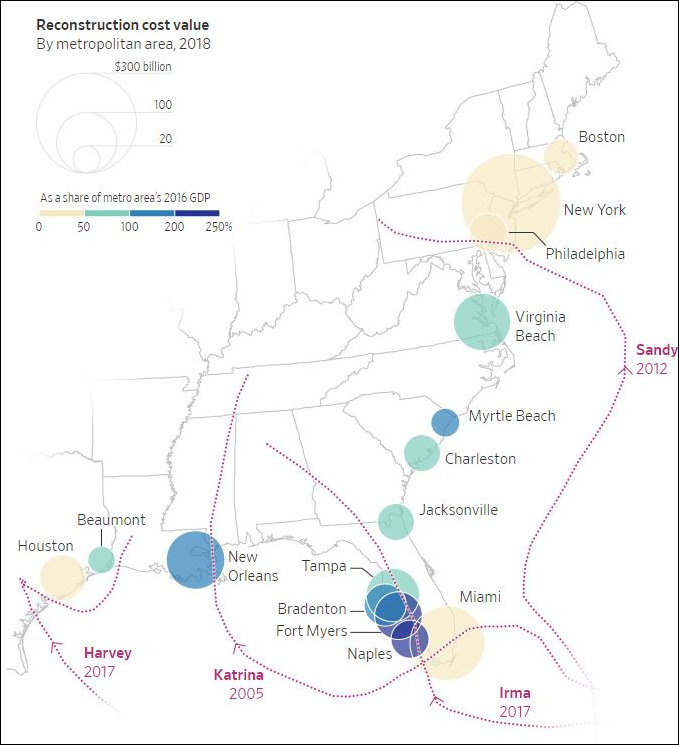
Graphic source: Wall Street Journal
John Rubino, publisher of Dollarcollapse.com, and I think a lot alike when it comes to the inevitable fiscal collapse of the United States. The country (indeed the globe) is riding high today on a giant credit bubble right now, but sooner or later the bubble will pop and the economy will crash. If you buy into my Boomergeddon theory — that the U.S. will experience massive social upheaval when federal and state governments are unable to maintain their commitments to core services and the social safety net — you might want to check his website for your daily frisson of fear.
I, like John, have been writing about the dangers lurking in states’ unfunded pension liabilities and the exploding student loan liabilities that are undermining our institutions of higher education. I’d urge John to give more coverage to the issue of hidden deficit spending in the form of growing infrastructure-maintenance backlogs. (Read the Strong Towns blog for a primer on state/local governments’ growth Ponzi schemes.) Meanwhile, in a recent post, John drives home a point to which I have given insufficient attention: the future cost of hurricanes.
Unlike unfunded pensions, student loan defaults and maintenance backlogs, upon which we can put reasonable figures, there is no way for Virginia to budget for hurricanes. The incidence of hurricane hits is relatively infrequent and highly random and the damages are so variable from storm to storm, that budgetary forecasts are a total crap shoot. But I think we can safely say three things about Virginia:
- Sooner or later, another large hurricane will hit Virginia;
- Subsidence and sea-level rise, which will occur even in the absence of global-warming scare scenarios, will magnify the impact of major storms;
- Continued development along the shorelines of the Atlantic Ocean and Chesapeake Bay will lead to more storm-related damage.
John is concerned about the prospect of a monster storm hitting a big city like Miami or New York and giving us “a trillion-dollar summer” that bankrupts major insurance companies, roils insurance markets, depletes federal flood insurance reserves and forces the U.S. government into another massive bail-out “just as federal deficits are exploding, public sector pensions are imploding, and student loans are defaulting en masse.”
I, too, worry that the federal government is headed for disaster. But as I observe the proceedings in Washington, D.C., I have written off the federal government. Our political culture in Washington is so dysfunctional, so toxic, so addicted to short-term political gain, that the federal government is beyond salvation. I don’t waste a lot of intellectual bandwidth wondering what might save Washington. Nothing can. But I would like to ensure that the Commonwealth of Virginia survives the wreckage. Some government entity will have to carry on when the federal government melts down, and state government is the only alternative.
But I worry about Virginia, too. As I blogged recently, we have no idea what governments and quasi-state agencies — from the Washington Metro to local economic development authorities — have piled up in long-term debt, unfunded pension liabilities, and maintenance backlogs, much less how vulnerable they are to the next economic downturn. Now, add the risk of damage from hurricanes to roads, bridges, railroads, water and sewer facilities, coal ash ponds, the electric grid, pipelines, and other infrastructure. How prepared are our state agencies and utilities to cope with a major disaster? What would the impact be on taxpayers and rate payers, what have we set aside in reserves?
In a word: How fiscally resilient is Virginia in the face of natural disaster? Puerto Rico showed how a hurricane can push a corrupt and mismanaged polity over the edge. Surely we’d hold up much better. But that assumes Uncle Sam can continue handing out billions of dollars in disaster relief and that insurance markets are functioning. No one knows. We live in ignorance at our peril.


